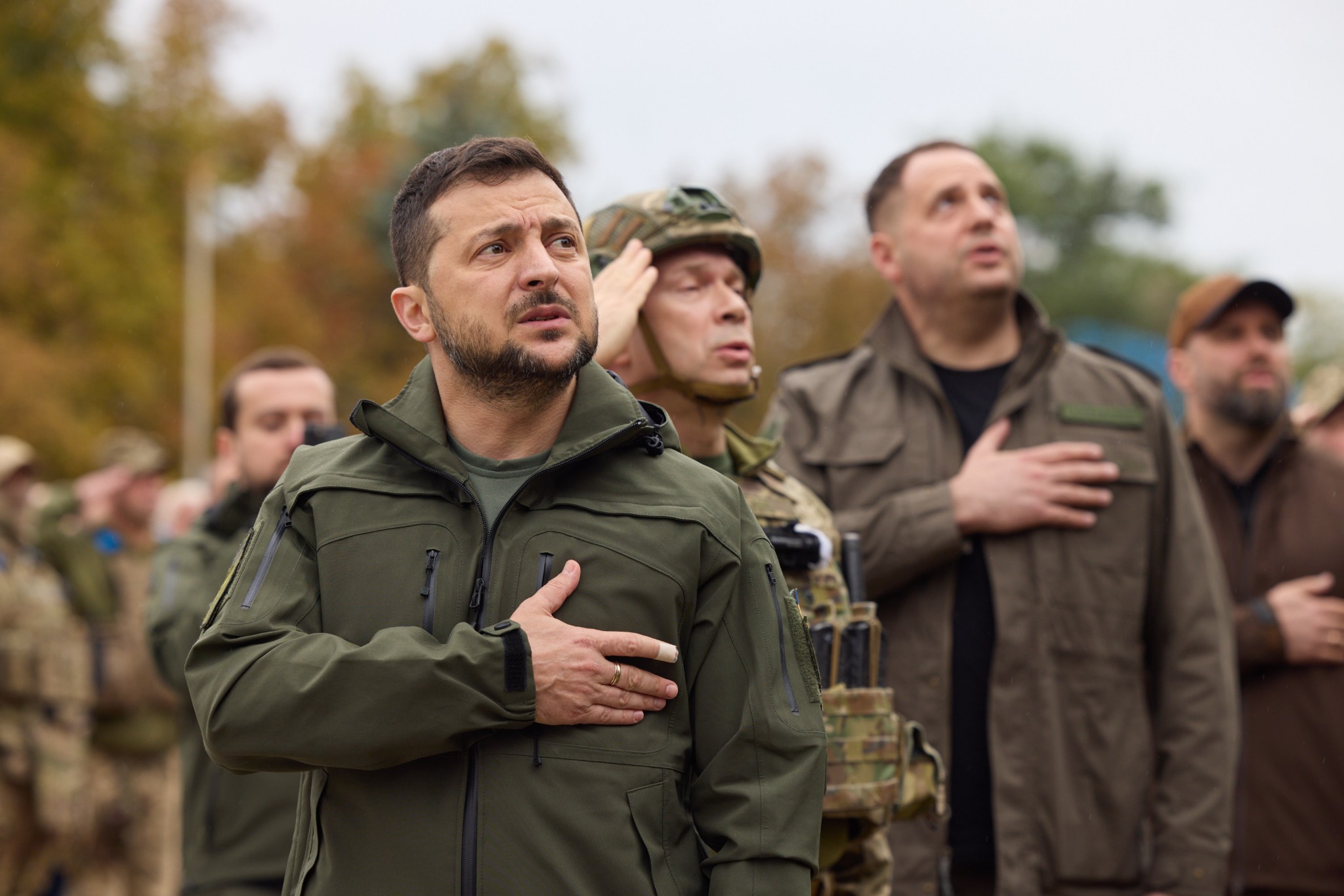 Ukrainian President Zelensky attends a ceremony raising the Ukrainian flag over liberated Izyum. Photo credit: website of the President of Ukraine.
Ukrainian President Zelensky attends a ceremony raising the Ukrainian flag over liberated Izyum. Photo credit: website of the President of Ukraine.
Despite Ukraine’s Military Success, it’s too Early to Celebrate
The past week has seen substantial progress in Ukraine’s efforts to defeat invading Russian forces. While recent Ukrainian success against Russian forces is heartening and gives hope that a Ukrainian victory rather than a stalemate is possible, it is too early to celebrate. The coming months are going to present several challenges to the Ukrainian military and the international coalition that supports it.
With rapid military advancement comes logistical challenges. Ukrainian units, pressing deep into territory captured by Russia, will need the fuel, ammunition, parts, and maintenance required to sustain that advancement. While Ukrainian units are concentrated as they punch through Russian lines, securing the territories liberated in their wake and the supply lines necessary to sustain them requires the gradual dilution of that concentrated force as personnel are left behind to fulfill those duties. The beginning of the war saw immense damage inflicted on massive Russian supply lines headed towards Kyiv; though Ukraine is unlikely to make as obvious a military blunder, the supply lines it needs to sustain its advancing forces will become more exposed and vulnerable to potential Russian attacks behind the front lines. History is full of examples of initial military successes that ultimately failed due to logistical failures.
Russia, despite its utter ineptitude in the course of this war, also should not be discounted. Historically, Russia (and the prior Soviet Union) has been able to absorb significant casualties but contribute enough personnel and equipment to achieve its military objectives. The Armed Forces of Ukraine have suffered significant casualties in this conflict. That Putin has thus far been hesitant to resort to mass conscription works in Ukraine’s favor. Resorting to conscription could upset Putin’s domestic support, but as a desperate move to turn the tide of war, doing so could also provide the bodies necessary to overcome Russia’s military incompetence and overwhelm Ukraine’s defenses.
The challenges Ukraine faces are not entirely military in nature. At risk is the coalition which supports it. As Western European countries and the United States are not under direct attack in this conflict, the political will to expend significant amounts of capital to support Ukraine is likely to wane. Some of that will can be affected by the duration of the conflict, as Western publics are prone to losing interest and patience as time goes on. Support will also be affected by the direct financial costs to European publics, which aside from major costs in arms, is largely experienced in the form of increasing energy prices.
While some energy prices have come down in recent weeks, the energy crisis started by Russia’s invasion has not truly been resolved. While Europe is actively weaning itself off Russian energy, winter is coming (which presents its own military challenges), and with winter comes higher demands for the type of energy most needed for heating. European countries are aiming for a 15% reduction in natural gas usage this winter, and Germany was ahead of schedule this August in the amount of gas it must stockpile in advance, but significant effort must be made to find other sources of gas and to reduce its consumption. For Germany in particular, which previously sourced 55% of its natural gas from Russia, this is a tall order, even as it has managed to reduce that number to 35%. These potential sticker shocks and shortages may reduce the willingness of European publics to weather the financial cost of another country’s security. There is some hope, however, as Goldman Sachs predicts that European natural gas storage will be sufficient to last the winter and will help slash prices, but this cannot be taken for granted.
The U.S. and its allies need to focus on several priorities over the next few months:
- Reinforcing European energy supplies to reduce the cost of winter and unforeseen costs or events.
- Solidifying a unified strategy for supplying Ukraine with weapons and ammunition.
- Seeking means to exploit Ukraine’s military momentum to prevent Russia’s ability to regroup and counterattack. Denying the ability of Russian forces to rest and resupply is going to be key in preventing a return to attrition.
- Assuring Ukraine has the logistical assets, offensive equipment, and training necessary to support its continued advance.
- Continuing and expanding the training of new Ukrainian recruits outside of the country to ensure the availability of quality replacement troops. The includes the additional training of Ukrainian trainers to ensure a home-grown ability of Ukraine to replenish its ranks with competent soldiers.
- Considering the implementation of longer-term training program on more advanced western weapons systems with the eventual aim of providing Ukraine with a qualitative advantage in equipment over Russia.
It is certainly possible that the Russian military could fold and chaos could ensue from mass retreat. But it is also possible that Putin, whose future is likely predicated on the internal fallout of this invasion, may choose to escalate in ways Ukraine is not prepared to handle. Working to ensure that both Ukraine and the Western publics that support it are prepared for the possibilities to come will be critical to ensuring success in the long-run.





